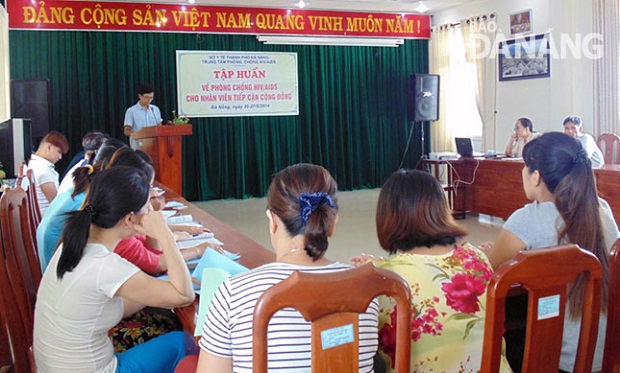Proactive measures to reduce HIV/AIDS
Over recent years, Da Nang has made more remarkable breakthroughs in its fight against HIV/AIDS than other localities in the country.
 |
| A training course on HIV/AIDS prevention and control for local community staff members |
At the start of 2015, approval was given by the city authorities to fund health insurance for HIV/AIDS-infected people who cannot afford to buy such cover independently.
According to the city’s HIV/AIDS Prevention and Control Centre, last year a total of 122 new HIV-infected cases were reported in the city, an increase of 20 against 2015. This has brought the total number of such patients in the city to 2,022, including 850 who have full-blown AIDS.
In attempting to reduce the number of new cases, various proactive measures have been taken in the city.
In particular, the Centre has worked closely with relevant local agencies to conduct screening tests for the early detection of HIV infections for timely treatment. Blood samples have been taken from female prostitutes and male drug users.
In addition, various meaningful community programmes have been carried out, focusing on homosexuals, detoxifed drug addicts, street prostitutes, and service staff at local entertainment venues.
The Centre’s director, Pham Thi Dao, said “Currently, 350 HIV-infected patients are receiving anti-retroviral (ARV) treatment at the centre. In addition, a total of 14,878 pregnant women have been screened for the early detection of HIV infections. Thanks to this, 7 cases have been diagnosed with the disease, and all have received treatment to reduce the risk of mother-to-child transmission of HIV. In addition, 1,530 patients suffering from tuberculosis and lung diseases have also been screened for HIV”.
Ms Dao continued, “At present, many of the HIV patients in Da Nang have come from other parts of the country, and the city is therefore finding it hard to fight against HIV/AIDS, as well as to manage those patients who are receiving methadone maintenance treatment. In attempting to ensure the effective management of them, our Centre has recently proposed that the city authorities help them to buy health insurance”.